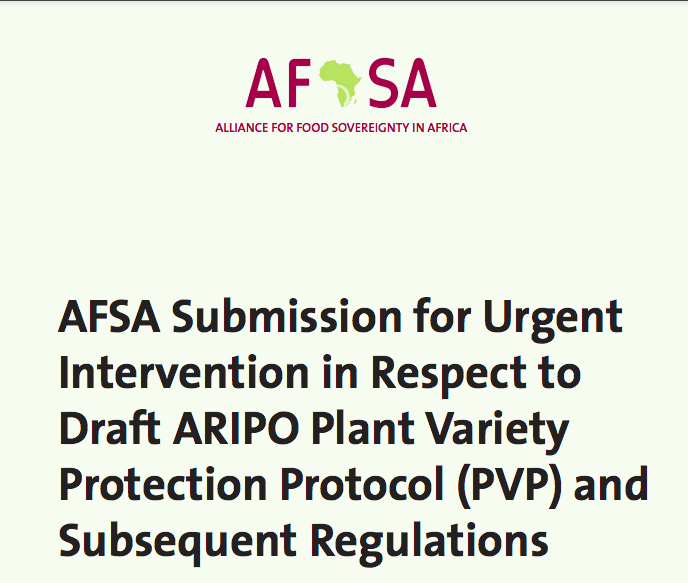Latest Resources

18 July 2024
Is Zambia’s food system collapsing?
Zambia’s collapsed food system: never-ending debt, climate shocks, biodiversity loss and FISPs – the indispensability of transitioning to agroecology In this briefing, we look at how Zambia is facing a gathering food crisis of serious proportions. Amidst repeated droughts and floods, energy rationing, and shortages of drinkable water, food prices are rising and millions are at risk […]

2 December 2022
Extractive tourism – a case study of biodiversity conservation in Tanzania, a legacy of gross hum...
This paper is part of a series of briefings by the African Centre for Biodiversity in the lead-up to the Convention on Biological Diversity’s (CBD) Fifteenth Conference of the Parties (COP 15) in December in Montreal, where a new deal – the Global Biodiversity Framework – will be finalised. In this paper, we deal with […]

2 December 2022
EXTRACTIVE TOURISM. A case study of biodiversity conservation in Tanzania, a legacy of gross huma...
This paper is part of a series of briefings by the African Centre for Biodiversity in the lead-up to the Convention on Biological Diversity’s (CBD) Fifteenth Conference of the Parties (COP 15) in December in Montreal, where a new deal – the Global Biodiversity Framework – will be finalised. In this paper, we deal with […]

21 October 2019
Transforming the farm input support programme (FISP) to diversified agroecology practices in Mong...
This fourth briefing in a series of four highlights key issues raised at a farmer exchange and learning event held in August 2019 in Mongu District, Western Province, Zambia. Namushakende Farming Institute (NFI) hosted the field visit and dialogue together with the Zambia Alliance for Agroecology and Biodiversity (ZAAB), Kasisi Agricultural Training Centre (KATC) and […]

14 October 2019
Transforming the FISP to diversified agroecology practices, Pemba District, Southern Province, Za...
The third in the series of four farmer exchange meetings in Zambia took place in July, in Pemba District, Southern Province. Through a partnership between the African Centre for Biodiversity (ACB) and the Zambia Alliance for Agroecology and Biodiversity (ZAAB), Kanchomba Farming Institute (KFI) hosted the field visit and dialogue, together with Kasisi Agricultural Training […]

2 August 2019
Transforming the Farm Input Support Programme (FISP) to diversified agroecology practices in Shib...
This is a second briefing paper to come out of farmer exchange events held in Zambia in May. The first exchange took place in Kalulushi District, Copperbelt Province, and you can find that briefing paper here. Then a second exchange was convened in Shibuyunji District, Central Province, where the objective was to continue sharing ideas […]

23 July 2019
Moving from the Farm Input Subsidy Programme (FISP) to Agroecology in the Kalulushi District, Cop...
This briefing highlights key issues raised at a farmer exchange and learning event held in May 2019 in Kalulushi District, in the Copperbelt Province of Zambia. The overall objective of the meeting was to share and exchange ideas on transitioning to a smallholder support system for diversified agroecological farming. Participants discussed the roles that farmers, […]

17 September 2018
The SADC PVP Protocol: Blueprint for uptake of UPOV 1991 in Africa
In the recently published discussion paper, ‘The SADC PVP Protocol: Blueprint for uptake of UPOV 1991 in Africa’, Sabrina Masinjila and Mariam Mayet, provide an updated critique on the regional Plant Variety Protection (PVP) system developed under the auspices of the Southern African Development Community (SADC) – the SADC PVP protocol – adopted by the […]

11 June 2014
AFSA Makes Small Gains for Farmers’ Rights in Draft SADC PVP Protocol
AFSA members participated at a SADC Regional Workshop that took place 13-14 March 2014, in Johannesburg, South Africa. The aim of the workshop was to review the draft SADC PVP Protocol. After marathon, highly contentious and difficult discussions, AFSA members were able to persuade member states to amend key provisions in the draft SADC PVP […]

9 March 2011
How US sorghum seed distributions undermine the FAO Plant Treaty’s Multilateral System
New data from ICRISAT and the US Department of Agriculture and a comparison of genebank records indicates that half of more of ICRISAT’s sorghum genebank collection is also being distributed outside of the Multilateral System. This yawning gap creates an economic incentive for the Multilateral System and its benefit-sharing requirements to be avoided. USDA’s sorghum […]
